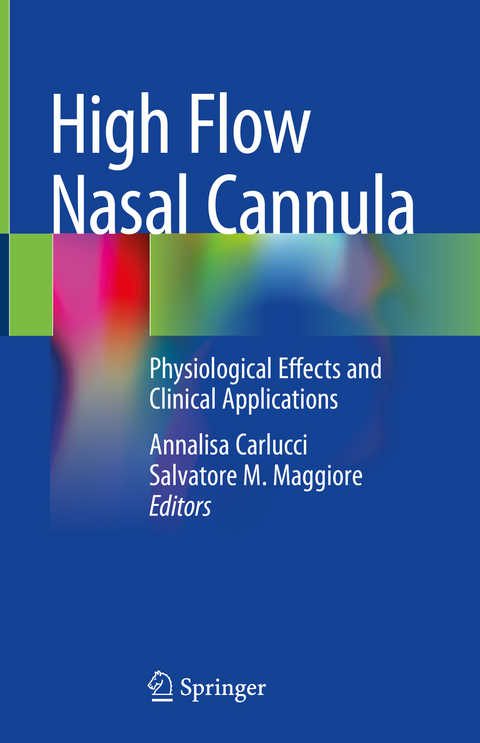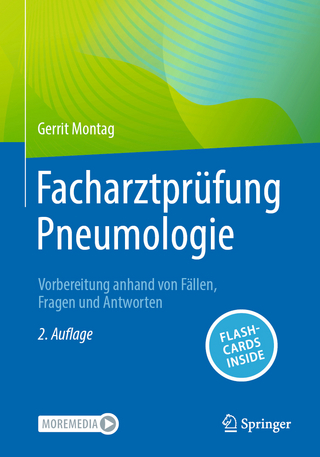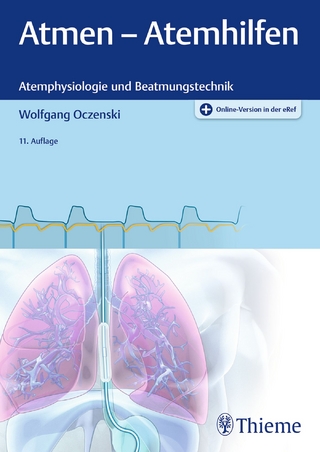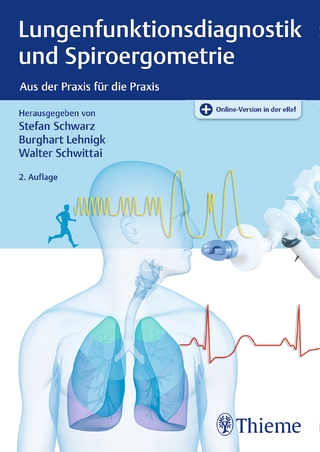
High Flow Nasal Cannula
Springer International Publishing (Verlag)
978-3-030-42453-4 (ISBN)
In the opening part of the book, readers will learn the differences between high-flow and low-flow techniques and gain an overview of HFNC's technical aspects and physiological effects.
The book subsequently describes the pathophysiological mechanisms involved in different respiratory diseases, analyzing how this technique positively impacts patients' respiratory status. The authors highlight clinical applications of HFNC, both in adults and in children, in various clinical settings - e.g. intensive care and semi-intensive care unit, emergencies, rehabilitation etc. - and present tips, tricks and pitfalls, as well as up-to-date reports on technical issues.
The book is intended for pneumologists, intensivists, anesthesiologists, ED doctors, rehabilitation therapists, internists and oncologists, as well as fellows and nurses in these fields.
Annalisa Carlucci has been an Associated Professor in Pulmonary Medicine -University of Insubria-Varese since 2019. Physician at the Pulmonary Rehabilitation Department of the Istituti Clinici Scientifici- IRCCS, Pavia, Italy since 2000. She completed her specialization in Pulmonary Disease at the Catholic University of Rome in 1997. Her main field of interest is non-invasive ventilation in an acute and chronic setting. Other research fields include weaning from mechanical ventilation, respiratory muscle (EMG, mechanics) and pulmonary rehabilitation. She is the author of more than 50 articles published in peer-reviewed journals and 7 books chapters. For the past several years she has been working with high-flow nasal cannula, above all in rehabilitation. She recently published a paper about the use of the HFNC for rehabilitation in COPD and is working on several protocols in this field. She is also involved in didactic activities held at hospitals (e.g. Master of Physiotherapy and Pulmonary Rehabilitation at the University of Milan and a Master of Respiratory Intensive Care at University Alma Mater Studiorum in Bologna), as well as at national and international conferences. Salvatore Maurizio Maggiore has been an Associate Professor of Anaesthesiology and Intensive Care Medicine at the SS. Annunziata Hospital, "Gabriele d'Annunzio" University of Chieti-Pescara, Italy, since 2015. He graduated in Anaesthesiology and Intensive Care Medicine from the University of Bari, Italy in 1998. He currently teaches on acute respiratory failure, respiratory pathophysiology, and mechanical ventilation in several Residency Programs at the Catholic University of Rome, at the G. d'Annunzio University of Chieti-Pescara, Italy, and at the Paris XII University, France. His main research programs are focused on acute respiratory failure, respiratory mechanics, invasive and non-invasive ventilatory support, cardiovascular effects of mechanical ventilation, and ethics in intensive care. He is the author of over 100 peer-reviewed papers, reviews, editorials and book chapters, has received several awards and grants from the Italian Society of Intensive Care, the European Respiratory Society, and the American Thoracic Society, and is regularly invited to speak at the main national and international congresses in Intensive Care Medicine. He is a member of several Scientific Societies (SIAARTI, ESICM). He was a Deputy Editor of the journal "Intensive Care Medicine" (2007-2013) and the Chair of the Editorial and Publishing Committee and a member of the Executive Committee of the European Society of Intensive Care Medicine (ESICM) (2011-2014). He currently serves as a reviewer for several medical journals, such as The Lancet Respiratory Medicine, the American Journal of Respiratory and Critical Care Medicine, Intensive Care Medicine, Chest, Critical Care Medicine, Anesthesiology, Critical Care, and the European Respiratory Journal.
1 Conventional oxygen therapy: technical and physiologic issues.- 2 High-flow: technical aspect.- 3 Physiological effects of high flow.- 4 Clinical applications of high flow nasal cannula in hypoxemic acute respiratory failure.- 5 Clinical applications of high flow nasal cannula during intubation and weaning from mechanical ventilation.- 6 Clinical applications of high flow nasal cannula in the operating room.- 7 Clinical applications in the acute setting: obstructive lung diseases.- 8 Clinical applications in Pulmonary rehabilitation.- 9 Clinical applications in particular setting.- 10 Physiological Effects and clinical applications in children.- 11 Future perspectives.
| Erscheinungsdatum | 02.06.2021 |
|---|---|
| Zusatzinfo | VI, 164 p. 16 illus., 14 illus. in color. |
| Verlagsort | Cham |
| Sprache | englisch |
| Maße | 155 x 235 mm |
| Gewicht | 414 g |
| Themenwelt | Medizinische Fachgebiete ► Innere Medizin ► Pneumologie |
| Schlagworte | air humidification • Airway clearance • high flow nasal oxygen • oxygen therapy • Pulmonary rehabilitation • rehabilitation psychology • respiratory failure • Respiratory Support • Weaning from mechanical ventilation |
| ISBN-10 | 3-030-42453-7 / 3030424537 |
| ISBN-13 | 978-3-030-42453-4 / 9783030424534 |
| Zustand | Neuware |
| Informationen gemäß Produktsicherheitsverordnung (GPSR) | |
| Haben Sie eine Frage zum Produkt? |
aus dem Bereich


